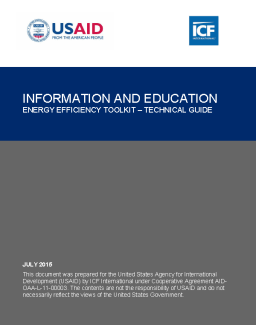Information and education initiatives—including public service campaigns, technical and marketing trainings and pilot projects—help stakeholders engage with energy efficiency programs and understand its value.
Information and education play an important role in demonstrating to key stakeholders the advantages of choosing to invest in energy efficiency. Initiatives can take the form of public service campaigns, technical and marketing trainings, and pilot projects. These initiatives help stakeholders engage with energy efficiency programs and understand how energy efficiency can add value to their households or businesses. They also help demystify the costs of investing in energy efficiency, which in turn promotes the growth and development of the energy services sector.
An example of how information can be used to drive stakeholder action on efficiency can be seen in USAID’s 2014 utility assistance study in Tanzania. (A summary of the project approach appears in the Case Studies section of this toolkit.) The study team worked with utility staff to analyze data on customers and energy usage. A program portfolio was then developed to cost-effectively produce demand and peak savings.The process and data were transparent, and the utility could see clearly how the energy efficiency delivered by the new programs would help them alleviate their energy supply shortages.
DISCLAIMER
This publication was produced for review by the United States Agency for International Development. It was prepared by ICF as part of the Energy Efficiency Toolkit. The author’s views expressed in this publication do not necessarily reflect the views of the United States Agency for International Development or the United States Government.

